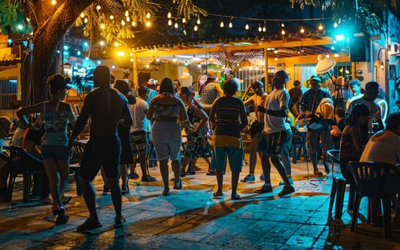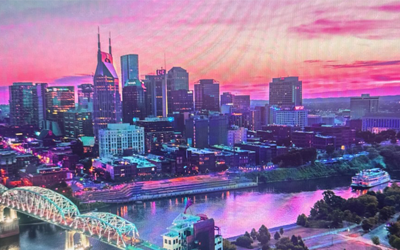


The Sociable City Trendspotting Forums offer a collaborative platform to tackle key challenges and explore exciting opportunities within the daytime and nighttime social economy.
Engage in peer-to-peer small group discussions on emerging issues in the social economy. Unlike traditional webinars, there are no presenters—everyone is an expert!
The collective experiences of participants will shape the development of future solutions.
Powering the Future of Music & Nightlife: Great shows don’t happen by chance—they thrive on collaboration between venues, local governments, and communities. But the balance between safety and financial sustainability is challenging.
Managing the Nighttime Economy: Cities across North America are stepping up, creating dedicated offices to champion nightlife. These efforts aim to streamline fragmented policies and strengthen support for venues and artists. A vibrant nighttime economy isn’t just entertainment—it’s jobs, tourism, and community identity.
Join the Movement and Set Priorities: Together, we can keep the music playing and the lights shining. Advocate for smart policies, support local venues, and be part of the energy that makes our cities come alive after dark.
The 2026 Sociable City Events will be your opportunity for networking and gathering strategies to manage your city's day and night social economy. We will take the results from the January Trendspotting Forum to build workshops and networking forums. Join in real life group discussions, and generate strategies with global peers.


A rising trend in vibrant nighttime social districts is the informal gathering of youth and young adults in public areas and parking lots. : While these meetups can foster community, they sometimes lead to disruptions—blocking pedestrian pathways or evolving into impromptu parties with loud music and alcohol. These “unregulated” activities often fall outside the scope of formal oversight, leaving local police to manage the consequences.
Is this happening in your city? : How are you addressing these disruptions? What kinds of social spaces or programs exist for youth who feel disconnected or underserved? Are there racial or socioeconomic dynamics at play?
We invite you to join the conversation: Share your experiences, strategies, and ideas for creating safer, more inclusive nighttime environments.

Restaurants and entertainment venues are navigating major challenges—from tariffs and immigration enforcement to shifting consumer habits and rising operational costs.
Since COVID, dining culture has evolved. People are embracing locally sourced food, food trucks and vendors, and the convenience of takeout and home delivery. These changes are reshaping the hospitality landscape.
We invite you to join the conversation.
How is your local hospitality industry adapting—and what support is needed to help businesses thrive.
Discussion Topics:

As tourism evolves, so too does nightlife. Are you ready to explore how these shifts might paint a new picture after dark?
The future nightlife is dynamic and intertwined with the evolution of tourism. By understanding the potential impacts, local businesses, residents, and policymakers can proactively shape the night scene to ensure it remains vibrant, diverse, and reflective of the unique community spirit while catering to a changing visitor landscape.
Let's discuss: How do you envision the future of your city’s nightlife in the face of evolving tourism? Share your thoughts and ideas!
Discussion Topics:

A growing trend among cities aiming to emulate the vibrant atmosphere of iconic spots like New Orleans’ Bourbon Street is the establishment of designated outdoor areas where people can carry and enjoy open, to-go containers of alcoholic beverages. This initiative fosters a laid-back environment for sipping drinks while exploring local attractions, dining, or shopping. These spaces go by various names, such as “Sip n’ Stroll” in Raleigh, NC, and “Designated Outdoor Refreshment Area” (DORA) in Ohio. While some critics express concerns about public safety and noise levels, successful implementations tackle these issues through clear regulations and collaboration among local governments, businesses, and communities.

Micro-mobility options like scooters and e-bikes offer a convenient, affordable, and eco-friendly way to navigate busy city centers. They provide a unique alternative for nighttime hospitality workers and residents when public transit is limited. However, there are growing concerns about safe operation at night. Reduced visibility at night due to poorly lit streets and uneven surfaces inhibit safety of riders, especially if their judgment is impaired from alcohol consumption. There are also challenges with storing bikes in already crowded Downtowns. Dockless scooters can often be found overturned on sidewalks, blocking the public right-of-way and inhibiting accessibility. Do the benefits outweigh the challenges of micro-mobility?

State and local governments around the country are turning to creative licensing reforms – such as open container zones, extended service hours, and music venue licenses – to support small business entrepreneurship and vibrant cities. State alcohol regulatory agencies carry the responsibility of issuing licenses to sell alcohol, but have dwindling resources to enforce at the local level. This at the same time of increased population, demands for licenses, and added responsibility in regulating cannabis, gambling, and other responsibilities.

Events and festivals have helped drive a return to Downtowns post-COVID. Yet some cities are struggling to keep up with multiple events that occur simultaneously or on consecutive weekends. Unlicensed "Pop-up" events are a new trend creating impacts and demands on services. Event planners are challenged to meet security requirements, insurance, and work through the permit process. There are some who claim there is "festival fatigue" or insufficient public space for events.

More cities recognize the value of having women involved in nighttime district police units and venue security. The image of a “burly bouncer” is being replaced by a new standard for excellent communication skills and de-escalation. The "30x30 Initiative" reports women police officers use less excessive force and are named in fewer lawsuits. This forum will discuss the benefits of recruiting more women in safety.

Today, 31 states allow the open carrying of firearms without a license or permit, with restrictions on entering an alcohol-serving establishment. Shootings inside venues are rare and risk can be greatly reduced through trained door security and venue safety procedures. Incidents of gun violence that take place in public space in social districts can send shockwaves through the community with sensational media reports sparking fear among patrons and employees alike. This forum will explore how social venues and public safety agencies can work together to make social districts safer.

It’s no secret that drug use, legal and illegal, is part of daytime festivals and nighttime socializing. Although “zero tolerance” is still the default in many places, drug policy in the U.S. is shifting. What would it take for cities to adopt a harm-reduction approach in their nightlife venues? Can licensing officials recognize that the role of security and staff at venues is better spent on harm reduction than apprehension? Should training focus on medical intervention for opioid overdose rather than trying to catch patrons with cannabis, coke, and MDMA?

Women experience going out at night differently from men. While women represent half the population, they are the majority of recipients of sexual harassment and violence. Most perpetrators are men, as are security staff, indicating a need for training and education of the other half of the population. However, many campaigns are solely directed at women or encourage changes to women’s behavior. Bring your ideas on making public spaces and social venues safer for female patrons and employees who work and play at night.

They were the first to close and the last to open. Live music and live music venues were greatly impacted by COVID era restrictions. As public demand increases, the music industry faces challenges from rent, security staff shortages, insurance and competition from festivals and events.

The lighting of the street with gas in the early 1800s created a safer life at night. The lamplighter became the foundation for modern-day policing. Yet as late-night problems emerged, police and policymakers debated closing hours for alcohol service. Today, this debate continues throughout the world, attempting to balance the social needs of adults and impacts on public safety and residential quality of life. Closing hours are the focal point without a definitive formula to achieve the desired outcome.

With the repeal of prohibition, states were given the authority to regulate the sale of alcoholic beverages. For almost a century, some systems have still governed the regulatory process, often hindering local authorities to determine how to best distribute licenses and address at-risk businesses in a timely manner.
.jpg)
Cannabis lounges are a hot new trend where you can consume on-site. But, you still can’t legally buy a drink and consume cannabis in the same space. This session will explore the role of cannabis in social districts and implications when you separate out spaces to consume different recreational substances.

Police are typically the catch-all for public safety challenges in nightlife settings. But other city, county and state agencies also play a critical role in nighttime safety. Learn how an inter-agency alliance can facilitate collaboration among code compliance, alcohol enforcement, fire and health departments. Benefits included data sharing, compliance training for businesses, and educational support prior to enforcement.

More cities are creating an office on nightlife with dedicated staff and advisory boards. It is an evolving field and job descriptions and structure vary considerably from city to city. The early pioneers have navigated the ambiguity of what a “night manager/night mayor” does on a day-to-day basis, and in some cities, resources are expanding to support additional staff and data analysis. Would a dedicated office on nightlife and staff be useful to enhancing sociability and controlling chaos?

Public space vibrancy offers a continuum of outdoor activities such as sidewalk dining, outdoor seating, street performers, markets, food vendors, festivals and art walks. Truly vibrant cities maintain social activity during day and night. COVID also introduced expanded parklets and streeteries, taking over parking and closing streets. Take-out and delivery, scooters and bikes, pedicabs, food trucks and deliveries all compete for reduced parking and infrastructure. Is it time for a nighttime “Street Venue Manager” to coordinate and manage the impacts?

Every week, there is another shooting in nightlife districts. The issue is complex, and various approaches are being tried, from metal screening at venue entrances to controlled access points in social districts. Social venues have been focused on training security on active shooters and conflict resolution. Cities are developing strategies to manage public space activity that contributes to personal conflicts and mass attacks.
Eighty-nine participants from 35 cities and four countries grappled with two open forums on gun violence hosted by RHI.